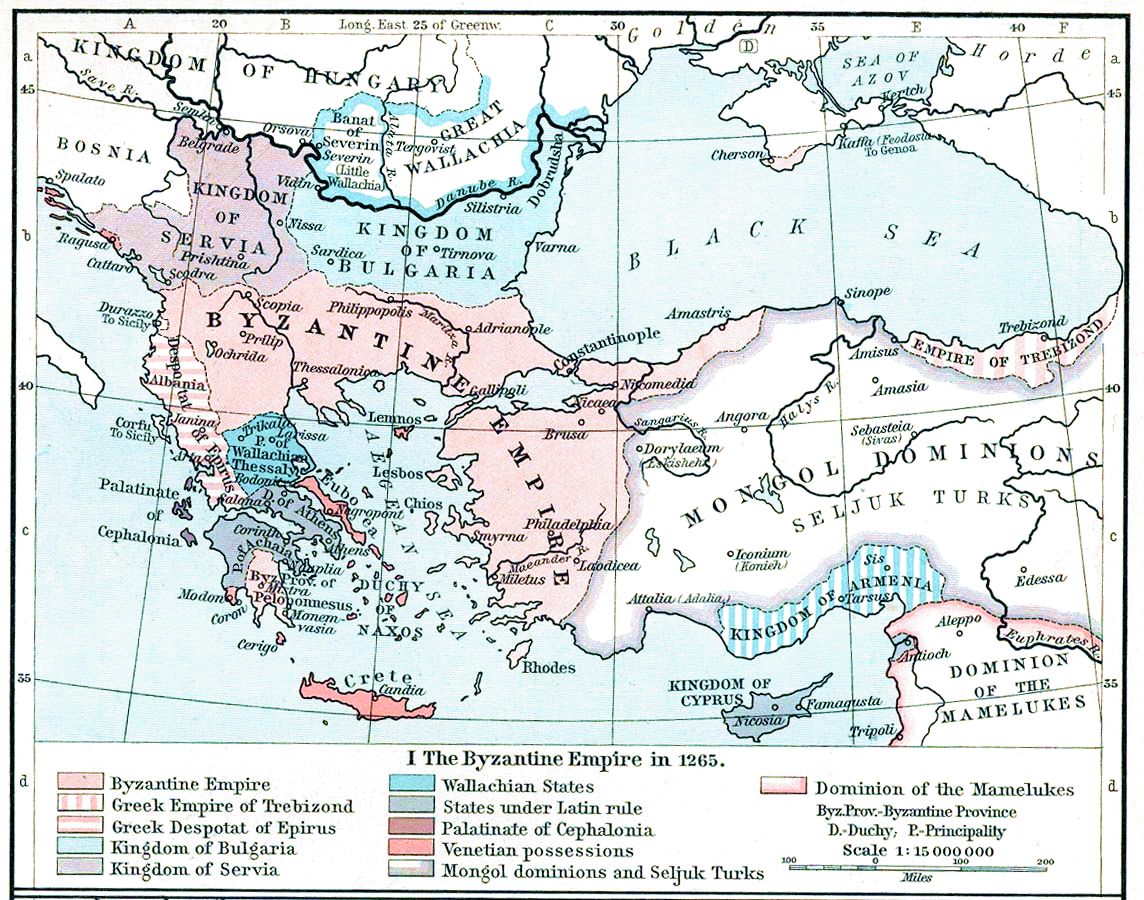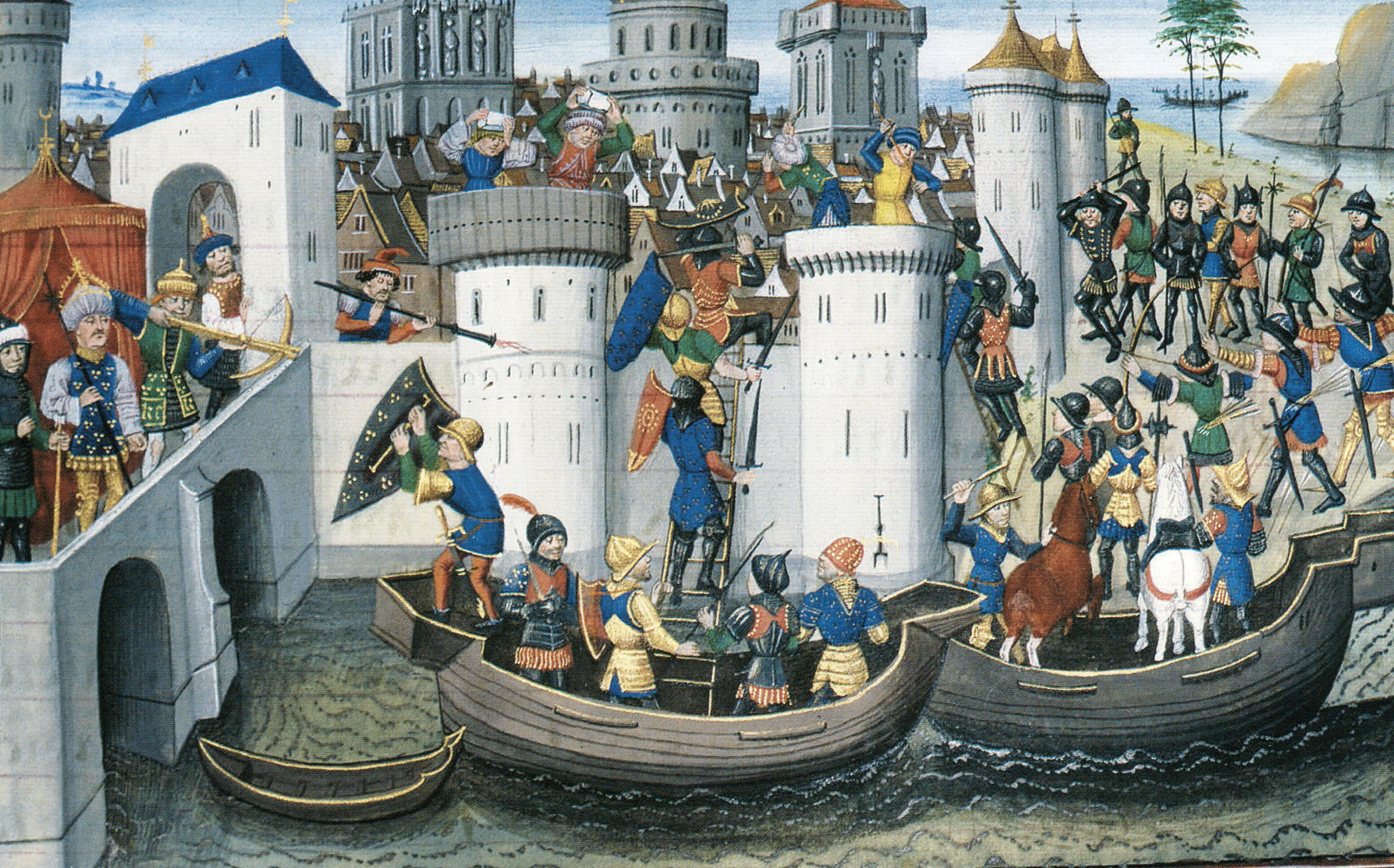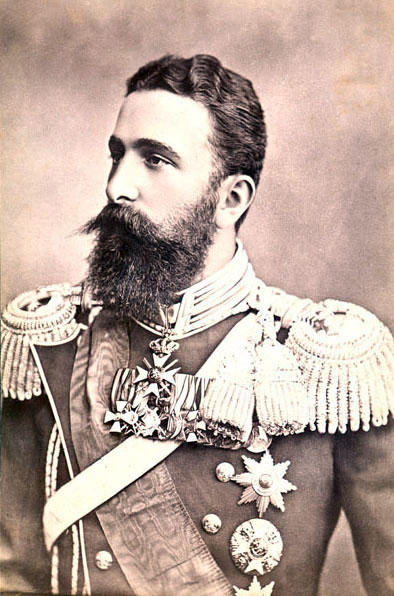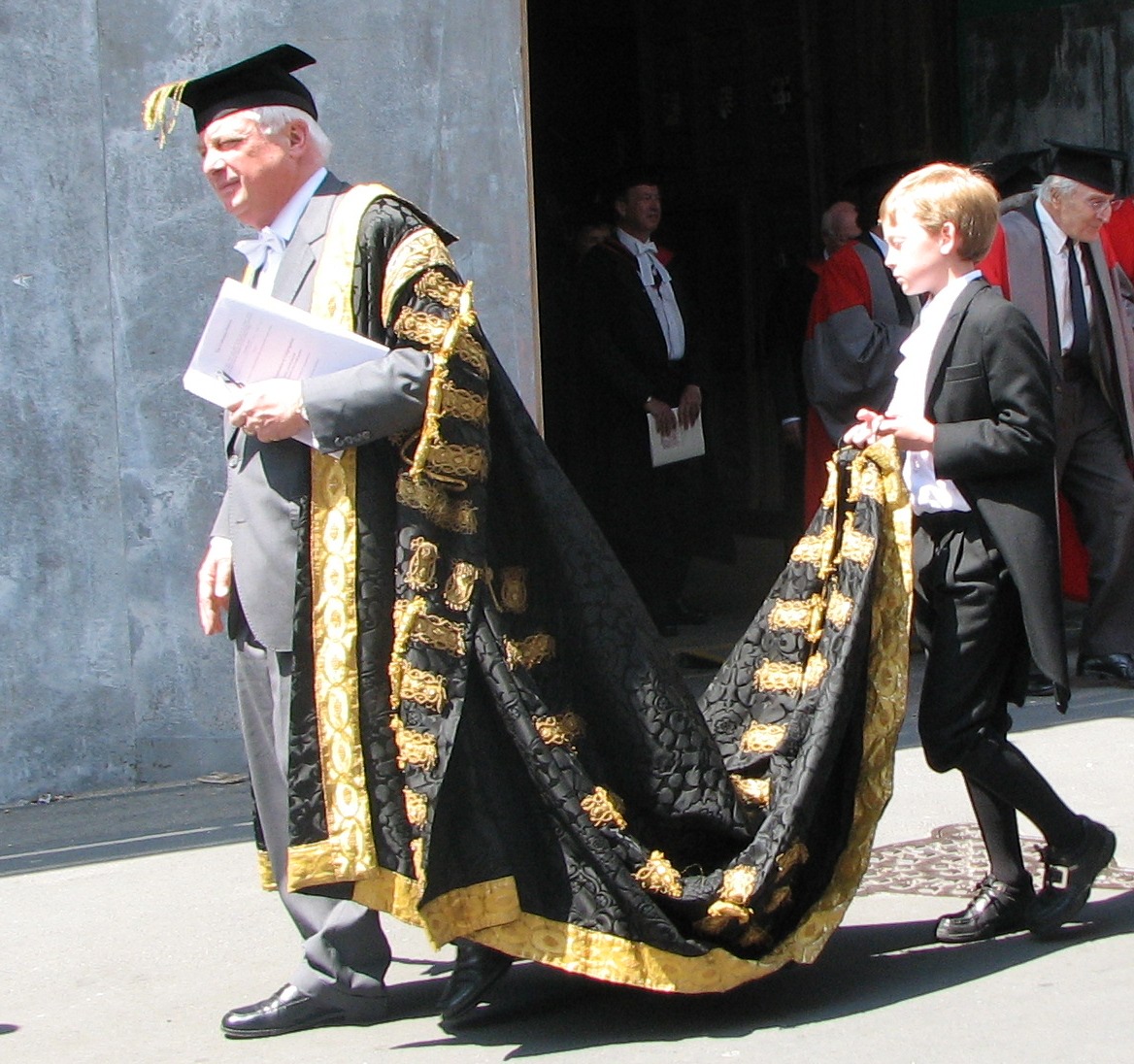|
Theodore II Lascaris
Theodore II Laskaris or Ducas Lascaris (; November 1221/1222 – 16 August 1258) was Emperor of Nicaea from 1254 to 1258. He was the only child of Emperor John III Doukas Vatatzes and Empress Irene Laskarina. His mother was the eldest daughter of Theodore I Laskaris, who had established the Empire of Nicaea as a successor state to the Byzantine Empire in Asia Minor after the crusaders captured the Byzantine capital, Constantinople, during the Fourth Crusade in 1204. Theodore received an excellent education from two renowned scholars, Nikephoros Blemmydes and George Akropolites. He made friends with young intellectuals, especially with a page of low birth, George Mouzalon. Theodore began to write treatises on theological, historical and philosophical themes in his youth. Emperor John III arranged for Theodore to marry Elena Asenina in 1235, to forge an alliance with her father, Ivan Asen II, Emperor of Bulgaria, against the Latin Empire of Constantinople ... [...More Info...] [...Related Items...] OR: [Wikipedia] [Google] [Baidu] |
Georgius Pachymeres
George Pachymeres (; 1242 – 1310) was a Byzantine Greeks, Byzantine Greek historian, philosopher, music theorist and miscellaneous writer. Biography Pachymeres was born at İznik, Nicaea, in Bithynia, where his father had taken refuge after the capture of Constantinople by the Latins in 1204. Upon the recovery of Constantinople from the Latin Empire by Michael VIII Palaeologus, Pachymeres settled there, studied law, entered the church, and subsequently became chief advocate of the church and chief justice of the imperial court. His literary activity was considerable, his most important work being a Byzantine history in thirteen books, in continuation of that of George Acropolites from 1261 to 1308, containing the history of the reigns of Michael VIII Palaeologus, Michael and Andronicus II Palaeologus. Pachymeres was also the author of rhetorical exercises on philosophical themes; of a ''Quadrivium'' (arithmetic, music, geometry, astronomy), valuable for the history of music an ... [...More Info...] [...Related Items...] OR: [Wikipedia] [Google] [Baidu] |
Theodore I Laskaris
Theodore I Laskaris or Lascaris (; 1175November 1221) was the first emperor of Nicaea—a successor state of the Byzantine Empire—from 1205 to his death. Although he was born to an obscure aristocratic family, his mother was related to the imperial Komnenos clan. He married Anna, a younger daughter of Emperor Alexios III Angelos in 1200. He received the title of despot before 1203, demonstrating his right to succeed his father-in-law on the throne. The Fourth Crusade forced AlexiosIII to flee from Constantinople in 1203. Theodore was imprisoned by the crusaders (commonly referred to as "Latins" by the Byzantines), but he escaped. After crossing the Bosporus into Asia Minor (in present-day Turkey), he started to organise the local Greeks' resistance against the Latins in Bithynia in his father-in-law's name. He concluded an alliance with the Seljuq sultan of Rum, but he could not stop the Latins' expansion. Neither could he prevent a claimant to the imperial t ... [...More Info...] [...Related Items...] OR: [Wikipedia] [Google] [Baidu] |
Balkan Peninsula
The Balkans ( , ), corresponding partially with the Balkan Peninsula, is a geographical area in southeastern Europe with various geographical and historical definitions. The region takes its name from the Balkan Mountains that stretch throughout the whole of Bulgaria. The Balkan Peninsula is bordered by the Adriatic Sea in the northwest, the Ionian Sea in the southwest, the Aegean Sea in the south, the Turkish straits in the east, and the Black Sea in the northeast. The northern border of the peninsula is variously defined. The highest point of the Balkans is Musala, , in the Rila mountain range, Bulgaria. The concept of the Balkan Peninsula was created by the German geographer August Zeune in 1808, who mistakenly considered the Balkan Mountains the dominant mountain system of southeastern Europe spanning from the Adriatic Sea to the Black Sea. In the 19th century the term ''Balkan Peninsula'' was a synonym for Rumelia, the parts of Europe that were provinces of the Ottoman E ... [...More Info...] [...Related Items...] OR: [Wikipedia] [Google] [Baidu] |
Latin Empire Of Constantinople
The Latin Empire, also referred to as the Latin Empire of Constantinople, was a feudal Crusader state founded by the leaders of the Fourth Crusade on lands captured from the Byzantine Empire. The Latin Empire was intended to replace the Byzantine Empire as the Western-recognized Roman Empire in the east, with a Catholic emperor enthroned in place of the Eastern Orthodox Roman emperors. The main objective to form a Latin Empire was planned over the course of the Fourth Crusade, promoted by crusade leaders such as Boniface of Montferrat, as well as the Republic of Venice. The Fourth Crusade had originally been called to retake the Muslim-controlled city of Jerusalem, but a sequence of economic and political events culminated in the Crusader army sacking the city of Constantinople, the capital of the Byzantine Empire. Originally, the plan had been to restore the deposed Byzantine Emperor Isaac II Angelos, who had been usurped by Alexios III Angelos, to the throne. The crusaders ... [...More Info...] [...Related Items...] OR: [Wikipedia] [Google] [Baidu] |
Emperor Of Bulgaria
The monarchs of Bulgaria ruled Bulgaria during the medieval First Bulgarian Empire, First ( 681–1018) and Second Bulgarian Empire, Second (1185–1422) Bulgarian empires, as well as during the modern Principality of Bulgaria, Principality (1879–1908) and Kingdom of Bulgaria, Kingdom (1908–1946) of Bulgaria. This list includes monarchs from the establishment of the First Bulgarian Empire until modern times, omitting earlier mythical rulers as well as rulers of separate states such as Old Great Bulgaria and Volga Bulgaria. Various titles have been used by the rulers of Bulgaria. The only recorded title, used before Bulgaria's conversion to Christianity, is ''kanasubigi'', likely meaning "Khan (title), Khan, Lord of the Army" or "the sublime Khan (title), Khan". When Bulgaria converted to Christianity in the ninth century, the ruler Boris I of Bulgaria, Boris I (852–889) was using the title ''knyaz'' (prince). For much of its later history under the first and second empires, ... [...More Info...] [...Related Items...] OR: [Wikipedia] [Google] [Baidu] |
Ivan Asen II
Ivan Asen II, also known as John Asen II (, ; 1190s – May/June 1241), was Emperor (Tsar) of Bulgaria from 1218 to 1241. He was still a child when his father Ivan Asen I one of the founders of the Second Bulgarian Empire was killed in 1196. His supporters tried to secure the throne for him after his uncle, Kaloyan, was murdered in 1207, but Kaloyan's other nephew, Boril, overcame them. Ivan Asen fled from Bulgaria and settled in the Rus' principalities. Boril could never strengthen his rule which enabled Ivan Asen to muster an army and return to Bulgaria. He captured Tarnovo and blinded Boril in 1218. Initially, he supported the full communion of the Bulgarian Church with the Papacy and concluded alliances with the neighboring Catholic powers, Hungary and the Latin Empire of Constantinople. He tried to achieve the regency for the 11-year-old Latin Emperor, Baldwin II, after 1228, but the Latin aristocrats did not support Ivan Asen. He inflicted a crushing defeat on Theodore Ko ... [...More Info...] [...Related Items...] OR: [Wikipedia] [Google] [Baidu] |
Elena Asenina
Elena Asenina of Bulgaria (; c.1224 – 1252 CE) (also Helena) was an empress consort of Nicaea, married to Theodore II Laskaris (r. 1254–1258). She was daughter of Bulgarian Emperor Ivan Asen II and Anna Maria of Hungary. Life Born in to Bulgarian Emperor Ivan Asen II and Anna Maria of Hungary, she was the sister of emperor Kaliman I of Bulgaria and princess Tamara of Bulgaria. Her maternal grandparents were king Andrew II of Hungary and Gertrude of Merania. On the paternal side, Emperor Ivan Asen I of Bulgaria and Elena of Bulgaria. She was originally betrothed to Baldwin II of Constantinople, the last Latin emperor. However, as part of an alliance between her father and the Nicaean emperor John III Vatatzes, negotiations began in 1233 on a marriage between her and Vatatzes' son and heir, Theodore II Laskaris. As a condition of this union, the Bulgarians demanded that the Bulgarian patriarchy be restored, while the Nicaeans received territory in Thrace. With these con ... [...More Info...] [...Related Items...] OR: [Wikipedia] [Google] [Baidu] |
George Mouzalon
George Mouzalon (; – 25 August 1258) was a high official of the Empire of Nicaea under Theodore II Laskaris (). Of humble origin, he became Theodore's companion in childhood and was raised to high state office upon the latter's assumption of power. This caused great resentment from the aristocracy, which had monopolized high offices and opposed Theodore's policies. Shortly before Theodore's death in 1258, he was appointed regent of Theodore's under-age son John IV Laskaris (). He was assassinated only a few days later by soldiers, as the result of a conspiracy led by the nobles under the soon-to-be emperor Michael VIII Palaiologos (). Biography Early life and service under Theodore II The Mouzalon family is first attested in the 11th century, but produced few notable members until the mid-13th century, with exception of Nicholas IV Mouzalon, Patriarch of Constantinople in 1147–1151.. George Mouzalon was born at Adramyttium on the western Anatolian coast in . His fa ... [...More Info...] [...Related Items...] OR: [Wikipedia] [Google] [Baidu] |
Page (servant)
A page or page boy is traditionally a young male attendant or servant, but may also have been a messenger in the service of a nobleman. During wedding ceremonies, a page boy is often used as a symbolic attendant to carry the rings. Etymology The origin of the term is uncertain, but it may come either from the Latin ''pagius'' (servant), possibly linked to peasant, or an earlier Greek word (''pais'' = child). The medieval page In medieval times, a page was an attendant to a nobleman, a knight, a governor or a castellan. Until the age of about seven, sons of noble families would receive training in manners and basic literacy from their mothers or other female relatives. Upon reaching seven years of age, a boy would be sent to the castle, great house or other estate of another noble family. This would match the age at which apprenticeships or servants' employment would be entered into by young males from lower social classes. A young boy served as a page for about seven ye ... [...More Info...] [...Related Items...] OR: [Wikipedia] [Google] [Baidu] |
George Akropolites
George Akropolites ( Latinized as Acropolites or Acropolita; , ''Georgios Akropolites''; 1217 or 1220 – 1282) was a Byzantine Greek historian and statesman born at Constantinople. Life In his sixteenth year he was sent by his father, the logothete Constantine Akropolites the elder, to the court of John III Doukas Vatatzes, emperor of Nicaea, where Akropolites continued his studies under Theodore Hexapterygos and Nicephorus Blemmydes. The emperor afterwards entrusted George with important state missions, as did his successors (Theodore II Laskaris and Michael VIII Palaiologos). The office of Grand Logothete, or chancellor, was bestowed upon him in 1244. He tutored Theodore II during the 1240s. As commander in the field in 1257 against Michael II, despot of Epirus, he showed little military ability. George was captured and kept for two years in prison, from which he was released by Michael Palaiologos. Meanwhile, Michael Palaiologos was proclaimed emperor of Nicaea, afterw ... [...More Info...] [...Related Items...] OR: [Wikipedia] [Google] [Baidu] |
Nikephoros Blemmydes
Nikephoros Blemmydes (Latinized as Nicephorus Blemmydes; , 1197–1272) was a 13th-century Byzantine author. Biography Blemmydes was born in 1197 in Constantinople as the second child of a physician. After the conquest of Constantinople by the forces of the Fourth Crusade in 1204, he migrated to Asia Minor. There, he received a liberal education in Prusa, Nicaea, Smyrna and Scamander. Blemmydes studied medicine, philosophy, theology, mathematics, astronomy, logic, and rhetoric. When he finally acquired a career as a cleric, he took an active part in the theological controversies between the Eastern Orthodox Church and the Roman Catholic Church, writing treatises on the Procession of the Holy Spirit, advocating the western usage. He was the tutor of the learned Theodore II Laskaris of the Nicaean Empire, and a great collector of classical texts. William of Rubruck reports that his benefactor, John III Doukas Vatatzes, owned a copy of the missing books from Ovid's ''Fasti''. Blem ... [...More Info...] [...Related Items...] OR: [Wikipedia] [Google] [Baidu] |
Fourth Crusade
The Fourth Crusade (1202–1204) was a Latin Christian armed expedition called by Pope Innocent III. The stated intent of the expedition was to recapture the Muslim-controlled city of Jerusalem, by first defeating the powerful Egyptian Ayyubid Sultanate. However, a sequence of economic and political events culminated in the Crusader army's 1202 siege of Zara and the 1204 sack of Constantinople, rather than the conquest of Egypt as originally planned. This led to the Partitio terrarum imperii Romaniae or the partition of the Byzantine Empire by the Crusaders and their Venetian allies leading to a period known as Frankokratia, or "Rule of the Franks" in Greek. In 1201, the Republic of Venice contracted with the Crusader leaders to build a dedicated fleet to transport their invasion force. However, the leaders greatly overestimated the number of soldiers who would embark from Venice, since many sailed from other ports, and the army that appeared could not pay the contracted price. I ... [...More Info...] [...Related Items...] OR: [Wikipedia] [Google] [Baidu] |








